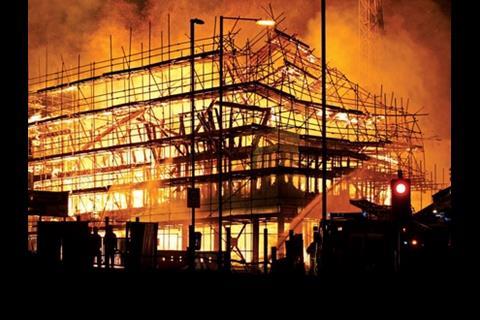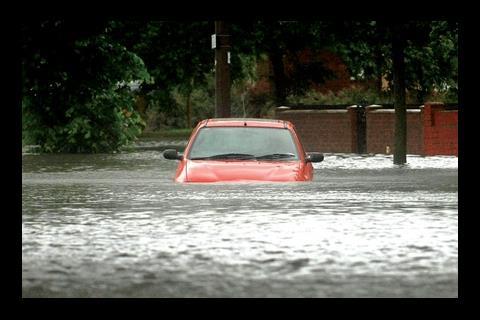It was the year of grabbing bites and juggling calls and searching for windows. The year we all got richer and busier and hung around by the lifts taking furtive calls on our mobiles. And it was the year that all that ended and we just wanted to cower under the bedclothes …
Developers played Hunt the Contractor. The government, struggling to deliver every major capital investment programme, preferred Frustration. For contractors, it was Dealer’s Choice as clients competed to offer the most enticing terms.

It was the year that everything expanded. Consultants’ fees rose by a quarter and staff by a fifth. Davis Langdon warned of the steepest tender inflation since 2000, and in London they went up 8%. Some materials rose much more than that, thanks mainly to China’s eternal boom. Steel prices rose 150% in two years, rebar was up a third and copper prices zoomed around like a deflating balloon. Lafarge rationed cement in the Midlands, and garden centres couldn’t get you timber fence panels for love nor money.
Then, everything changed.

The credit crunch shook the property world, and suddenly, it was the year that every spreadsheet grew question marks, and all those visualisations of the London skyline started to look speculative. And on the home front, house prices began to fall, but not as fast as housebuilders’ shares.
Those with long memories can point to other periods when the economy misfired and the sky appeared to be falling ‚Äď after the dotcom crash, for instance. But if the ghost of Christmas past was a jolly chap with a sackful of dumper trucks and contracts and bank transfer statements, then the fear is that the ghost of Christmas future might just be a lean solicitor with a pocket full of writs, small change and P45s.
Year of the dragnet
On 22 March, gasps could be heard in the boardrooms of the construction industry as the Office of Fair Trading announced that its two-year investigation into price-fixing had gone a lot further than anyone guessed. More than 50 offices had been raided, 37 companies had applied for leniency, bid-rigging had been detected in £3bn worth of tenders.
Nobody knew who’d been caught. Then, over a feverish few days in May, Balfour Beatty, Kier, Rok, Galliford Try and Interserve all admitted that the OFT was examining their books. About 150 others had received letters from the watchdog.
Then in November, the OFT raised the stakes higher, saying it would consider using its powers to bring criminal prosecutions …
Love
There was frenzied coupling in the industry this year, with housebuilders at it like rabbits and consultants going through a kama sutra of mergers.
Barratt bought Wilson Bowden for ¬£2.2bn in April to become the UK‚Äôs biggest housebuilder ‚Äď but only for three months. The greatest love of all was Taylor Woodrow and Wimpey, with a ¬£5bn wedding in July.
All that action put the contractors in the mood, with Carillion beating the pack to buy Alfred McAlpine this week.
As for the consultants, QSs Boxall Sayer, Denley King and Fletcher McNeill merged in August to form the soon-to-list consultant Baqus. Cyril Sweett didn’t buy anyone but it did list on the stock market in October, creating a £25m fund for acquisitions.
And there was a flurry of hot euro activity among the engineers. Danish firm Ramboll bought Whitbybird; Dutch engineer Arcadis bought architect RTKL and project manager APS; and Tropus merged with Spicer.
But there were break-ups too … The biggest was Amec which sold the last bits of its built environment division to Morgan Sindall in May.

Comeback kids
Some old faces had a new lease of life in 2007. Stewart McColl planned a a takeover of SMC, the architectural group he founded and shepherded through numerous acquisitions, share peaks ‚Äď and, more recently, troughs. But the City didn‚Äôt seem so keen ‚Ķ
There were comebacks on a grand scale when prime minister Gordon Brown invited developers to submit proposals for 10 eco-towns. He was swamped with 57 submissions, but many of them looked suspiciously familiar, with developers taking the opportunity to tart up old schemes.
The most exciting Lazarus act was Crossrail, the ¬£16bn east-west London rail link that has been on the backburner for 18 years. The government at last announced a funding package in October. The aim is to repeat the success of the newly opened Channel Tunnel Rail Link and St Pancras station. Self-proclaimed ‚Äúbulldozer‚ÄĚ Doug Oakervee, the project‚Äôs chairman, told ļ√…ęŌ»…ķTV that ‚Äúthere is no question of cost overruns on this job‚ÄĚ.
But Currie & Brown is the year‚Äôs comeback king. In March, one onlooker described it as ‚Äúlittle lamb lost in a forest‚ÄĚ, with sackings, employment tribunals and takeover bids coming at it from all sides. By last month, chief executive Euan McEwan could claim success for a ¬£2.8m restructuring programme, with an order book 20% up on last year.

St Pancras has arrived
England‚Äôs new front door was opened by the Queen last month in an ceremony that ‚Äúbefitted what is possibly the world‚Äôs most impressive station‚ÄĚ according to ļ√…ęŌ»…ķTV. Others were less impressed, with columnist and critic Gus Alexander remarking that the details were ‚Äúmore like Wickes than Foster or Grimshaw‚ÄĚ.

Denton Corker Marshall‚Äôs Civil Justice Centre for Manchester was one of the outstanding buildings of the year. Here‚Äôs how Martin Spring described it on its opening in July: ‚ÄúA 15-storey filing cabinet is enough to stop any visitor to central Manchester in their tracks. Its delicate glass drawers have been pulled out at random and threaten to topple onto you as you cross the bridge over the Irwell river from Salford. At the opposite end, another random collection of drawers projects into thin air. One flank is fronted by a projecting window wall of pure transparent glass. The other is overlaid by a mysterious patterned veil of grey steel.‚ÄĚ

The year of living dangerously
This year has been marred by an appalling series of crane accidents and scaffolding collapses. By March, another man had been killed in a crane accident and others seriously injured. High summer saw seven fatalities in two weeks and last month a worker was crushed to death in a lift shaft at Heathrow’s Terminal 5, a project previously applauded for its safety record.
Health and Safety Executive inspections in June and July found that almost a third of refurb sites were seriously endangering lives and that half of all deaths occurred on refurbishment and housing sites. In November, we found out that workers on building sites were more likely to be injured in their jobs than those in any other sector, confirming our worst fears.
Peter Hain, the work and pensions secretary, organised a safety forum in September that led to a package of measures being agreed between government and industry, including a recommendation that all housebuilding workers carry CSCS cards. The HSE has also pledged to conduct a blitz on refurbishment sites early next year. And, thanks to ļ√…ęŌ»…ķTV‚Äôs Safer Skyline campaign, the issue of crane safety has gone right to the top of the agenda.

Roll over Beethoven
In June we were treated to Allies and Morrison’s splendid, reverential £91m refurbishment of the Royal Festival Hall. Actually, it wasn’t so much an updating as a restoration of the building to its original glory, freed from commercial clutter and the auditorium’s god-awful acoustics …

The land that taste forgot
More egregious designs emerged from the land where anything seems to be possible. That one over there is the seven-star Aperiron hotel designed by Sybarite Architects, which has a two-storey jungle at the top of its 28-storeys and would be accessible only by boat or helicopter. By October, the RIBA announced it was setting up an office there to raise the quality ‚Äď not before time ‚Ķ

Running on empty ‚Ķ June was the month that all sorts of things suddenly fell into short supply. The price of a standard 6 √ó 6ft garden fence panel went from ¬£20 to ¬£80 at DIY stores, steel prices had soared 150% in two years and Lafarge began rationing concrete. The reason was global competition for materials ‚Ķ ‚ÄúChina‚Äôs construction spend will increase by nearly 9% every year up to 2011; the Indian government is a year into a five-year infrastructure programme worth ¬£96bn. Meanwhile, ¬£22bn of foreign investment poured into the former communist states of eastern Europe in 2006, and much of it is going to fuel a building boom.‚ÄĚ
The year of the code

In sustainability, the big news was the Code for Sustainable Homes. Here was no-messing legislation, the kind that could really tackle climate change. The trouble was that it was all down to the industry to deliver, and it did not take it long to realise that this meant that it had to get into the power generation business, producing renewable energy for the homes on site. The first stab was unveiled in June at BRE in Hertfordshire. Four homes were specially designed and built to demonstrate how they could meet the code targets. An event normally reserved for industry geeks suddenly had the national media crawling all over it …

So long Tony, hello Gordon
In May, ļ√…ęŌ»…ķTV said a big, sloppy goodbye to the prime minister who had sent ¬£277bn worth of work the industry‚Äôs way since 1999. ‚ÄúTony Blair deserves a raised glass,‚ÄĚ said a misty-eyed Tony Bingham, although he had never voted for him.
The feeling turned out to be mutual. When ļ√…ęŌ»…ķTV's guest editor Baroness Ford caught up with TB at the Lords, he told her: ‚ÄúWe have some of the greatest buildings in the world in the UK, and some of the best architects.‚ÄĚ
All of a sudden, Blair was gone. The Housing Corporation and English Partnerships, on the other hand, are enjoying the longest goodbye in quango history. Still, it’s giving Gordon and his gang plenty of time to debate a name for their successor. First it was Communities England, then the New Homes Agency. Now both have been scrapped in favour of a compromise option, the Homes and Communities Agency.
More pressing has been London Underground‚Äôs troubled refurbishment programme, which derailed spectacularly in July when consortium Metronet went into administration. In September there was more misery for Brown when we reported that the ļ√…ęŌ»…ķTV Schools for the Future programme was falling short. Only seven of the 100 schools it promised to build by the end of 2007 had been completed. Now there is yet another review by Deloittes under way ‚Ķ

You‚Äôve had your chips: 2007 was the year that we learned how many unfortunate subcontractors had been killed and injured by the Wembley stadium project. It was also the year that ļ√…ęŌ»…ķTV launched its Nouvel Canteen competition to find the industry‚Äôs best site eatery ‚Ķ
Hips trouble
Who would have thought that the introduction of home information packs would take longer than the wait for an NHS hip operation? Well, technically, it‚Äôs taken ministers a decade.The past year saw the complicated birth of Hips, which were formally introduced by the Housing Act back in 2004. But everything was turned on its head in May when the RICS threatened to take legal action against the government because of its lack of consultation. And even if it hadn‚Äôt, there were nowhere near enough assessors to produce the energy certificates. Ruth Kelly, the then community secretary, admitted that only 520 assessors were available instead of the 2,400 promised. The judicial review was dropped when the government postponed the launch of Hips until August ‚Äď and limited them to four-bedroom properties. HIPs were extended to three-bedroom homes in September, and from this week, one and two-bedroom properties also fall within their remit.


Olympics
When, in February, the Olympic Delivery Authority submitted its planning application for the Olympic park it promised us a ‚Äúyear of Olympic design‚ÄĚ ‚Äď and what a mixed meal that has turned out to be.
The dish everyone thought was going to be the tastiest, HOK Sport‚Äôs Olympic stadium, seemed to be more a puffed-up hors d‚Äôoeuvre than a main meal when the designs were revealed in November. No wonder ļ√…ęŌ»…ķTV‚Äôs readers voted to name it ‚Äúthe Vol-au-vent‚ÄĚ. It is expensive, too: the cost has soared from ¬£280m last year to ¬£496m.
The look of Zaha Hadid’s aquatics centre also left a bitter taste. After designs were reworked for a second time in June, it now seems likely that the venue’s wave-form roof will be book-ended by banks of temporary seating.
Some offerings were simply sent back to the kitchens. Both Hochtief and Eiffel pulled out of tendering for the aquatics centre, leaving Balfour Beatty the sole bidder, with a price tag of about £200m. Foreign Office Architects quit as masterplanner of the Olympic park in May, and Norwest Holt dropped out of the bidding for the 1.5ft2 media centre in September, leaving just Carillion and Bouygues in the running.
There were however plenty of firms only too willing to take a bite of the Olympic pie. Hopkins Architects won the velopark, Make Architects took the handball arena, Wilkinson Eyre got the basketball arena and Heneghan Peng bagged the Olympic footbridge. Lend Lease won the £4bn Olympic village contract and promptly put 47 small architects on its design shortlist.
The main point of concern remains the cost. In March, Tessa Jowell ‚Äď then secretary of state for culture, media and sport, now Olympics minister ‚Äď revealed that the ‚Äúdefinitive‚ÄĚ cost of the Games would be ¬£9.3bn, including a ¬£2.7bn contingency fund.
But then earlier this week, she conceded that this wasn’t likely to be the end of the story …
Top quotes
"We don’t hug trees and do Kum Ba Yah"
Murray Coleman on Bovis Lend Lease’s management style
"The kids at the event drank too much and went a bit OTT. That’s it"
A company executive explains away the antics of his younger staff at the RICS young surveyors ball in April
"Climate change has turned into a religion. People will come to their senses but it will take a bit of time"
Heretical views on climate change From Nigel Lawson in June
"The Dome is probably the cheapest building we ever built … but I went to the opening day of the exhibition and that was terrible"
Richard Rogers in November






























No comments yet